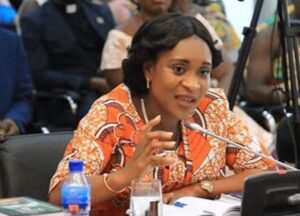Ghana government launches nationwide campaign to empower financial services consumers

The government has launched a national financial education campaign to empower consumers and improve their knowledge of the financial system to enable them to make sound financial decisions that promote and secure their financial interests.
The primary goal of the campaign is to equip consumers of financial services with the capacity to act in their own best interest given their socio-economic development and environment.
Speaking at the launch, Deputy Minister for Finance, Madam Abena Osei-Asare, said recent developments in the financial sector called for a timely and comprehensive financial education programme to address issues in the financial sector.
She said the comprehensive campaign would allow radio and TV discussions, public fora, town hall engagements and social media campaigns as well as educational materials developed and translated from English into 11 local languages, including Ga, Akwapim Twi, Asante Twi, and Ewe.
The Government’s National Financial Inclusion and Development Strategy (NFIDS) seeks to increase financial inclusion from 58 per cent to 85 per cent by 2023 by adopting five mutually reinforcing pillars of financial sector development namely financial stability; access, quality and usage of financial services, financial infrastructure, financial consumer protection and financial capability.
“The 5th pillar bolstering financial capability highlights the need to increase financial education on consumer awareness and understanding of financial products to enhance consumers’ ability to manage their finances. The government recognizes that informed customers help create a more competitive and efficient market,” she said.
“Without this, many people will resort to the old and unsecured ways of handling monies, such as keeping monies under pillows and mattresses. Apart from the fact that these are unsafe methods of keeping money, these behaviours also deprive the financial sector of access to excess liquidity from individuals, households and businesses for economic development,” she added.
According to her, the lack of understanding of financial operations contributed to the recent financial sector crisis that led to the lock-up of funds of many depositors and investors, leading the government to spend over GH¢25 billion of public funds to clean up the sector and to bail out customers.
“Despite the clean-up exercise, many financial consumers continue to use financial products and services without understanding the risks associated with these products nor the benefits thereof. The lack of deliberate financial literacy programs to educate Ghanaians on the operations of the financial sector, and identification of Ponzi schemes and other illegal/fraudulent investment schemes are some of the many reasons why a vast majority of Ghanaians remain vulnerable to financial fraud,” she emphasized.
On his part, the Director of the Financial Sector Division of the Ministry, Mr. Sampson Akligoh, said the campaign’s design was a collaborative effort by financial sector regulators and industry associations.
He said following the difficulties of customers and investors faced during the clean-up exercise, the Government with financing from the World Bank commissioned the Ghana Financial Sector Development Project to promote financial sector soundness and access to financial services by individuals.
A key component of the project is the design and roll-out of a comprehensive financial education campaign to bolster the financial capability of Ghanaians and to promote responsible financial behaviours,” he added.
As a result, the government, in collaboration with financial sector regulators and industry associations, is implementing the National Financial Education Campaign to strengthen Ghanaians’ financial capability and promote responsible financial behaviours.
Source: GNA
